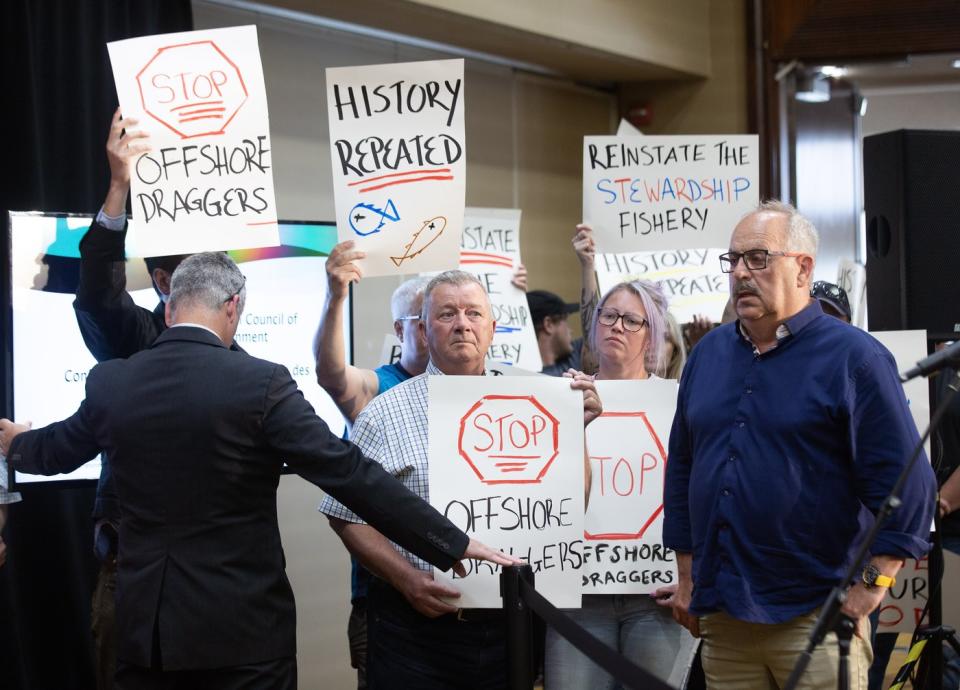Newfoundland fishers protest interrupts environment ministers' press conference

ST. JOHN'S, N.L. — About a dozen fishers interrupted a news conference with the country's environment ministers in St. John's on Wednesday to demand the federal government reinstate a 32-year moratorium on commercial cod fishing in the province.
Protesters rang a siren on a bullhorn and carried signs saying "Save our cod" and "Stop offshore draggers" as fisher Glen Winslow took over the podium to deliver his message.
He said he and other members of the union representing inshore fishers oppose Ottawa's recent decision to reopen the fishery and allow foreign and offshore vessels — what they call "draggers" — a portion of the catch.
"This is very important to all Newfoundlanders, this is the lifeblood of rural Newfoundland and Labrador, make no mistake about it," Winslow said. "It's unfortunate that we had to disrupt your meeting here today to try and get the message out, but it seems like we have no other choice."
The Canadian Council of Ministers of the Environment were in St. John's for a regular meeting, during which they discussed climate change. Bernard Davis, who holds the climate change and environment portfolio for Newfoundland and Labrador's Liberal government, hosted the affair.
He and his colleagues appeared unbothered by the fishers, who left after Winslow and Greg Pretty, president of the Fish, Food and Allied Workers Union, each gave a brief speech and demanded a meeting with Prime Minister Justin Trudeau.
"I'm supportive of what they're looking to accomplish with respect to protecting the fishery for the long-term for the people of Newfoundland and Labrador," Davis said about the fishers. "I can appreciate fully that this is their livelihood."
Federal Environment Minister Steven Guilbeault, who attended the event in St. John's, said responsibility for fisheries falls to Canada's fisheries minister, Diane Lebouthillier. He said he would deliver to her and Trudeau the harvesters' request for a meeting.
Ottawa first imposed a moratorium on commercial fishing for northern cod off Newfoundland and Labrador's east coast in 1992. Cod was once the backbone of the province's fisheries, but the northern cod stock collapsed after years of mismanagement, overfishing and environmental change.
The federal government announced last month that it would reopen the fishery with a total allowable Canadian catch of 18,000 tonnes for the 2024 season. Another 950 tonnes could be caught by foreign offshore vessels.
Though ministers from many of the provinces that oppose the federal carbon pricing plan were at the conference in St. John's, Guilbeault said carbon pricing — often called the "carbon tax" — did not dominate discussions. When it did come up, he said there was little tension.
"I would argue that the tone of our discussions over the last few days has been collegial," he said.
He spoke about the urgency of climate change, noting that extreme weather events such as fires and floods are now occurring annually across the country. Meanwhile, in waters about 500 kilometres off the coast of St. John's, ExxonMobil is drilling a deepwater well in hopes of finding more oil.
Guilbeault approved an offshore oil development project led by Norwegian energy giant Equinor in the same area in 2022.
"We are trying to find ways to reduce our dependencies on fossil fuels, and increase our reliance on non-emitting technologies," the minister said. "We will continue using fossil fuels in a carbon-neutral world in 2050. We will be using far less fossil fuels, whether it's oil or natural gas, than we're using today, but they will still play a part in our energy portfolio in a carbon-neutral world."
This report by The Canadian Press was first published July 10, 2024.
Sarah Smellie, The Canadian Press

 Yahoo Finance
Yahoo Finance 